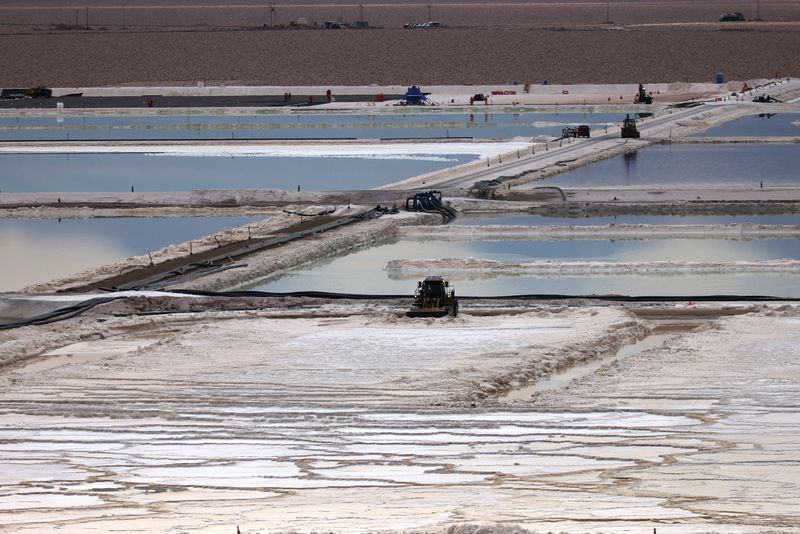By Ernest Scheyder
LAS VEGAS (Reuters) - Lithium producers are growing anxious that delays in mine permitting, staffing shortages and inflation may hinder their ability to supply enough of the battery metal to meet the world's aggressive electrification timelines.
Once a niche metal used primarily in ceramics and pharmaceuticals, lithium is now one of the world's most in-demand metals given aggressive EV plans from Stellantis, Ford and other automakers.
At stake is the pace with which electric vehicles could displace internal combustion engines, a key goal of the green energy transition.
"You could end up in a crisis situation where the battery companies don't have the security of (lithium) feedstock," Stu Crow, chairman of Lake Resources, said on the sidelines of this week's Fastmarkets Lithium and Battery Raw Materials conference in Las Vegas.
"There's a disconnect between the panic that we're seeing here, and the frenetic activity of trying to secure supply within the industry."
This week, Lake Resources became the latest lithium company to announce a project delay, pushing back first production from its Kachi lithium project in Argentina by three years. It cited power supply and other logistics concerns.
Albemarle, the world's largest lithium producer, is growing rapidly across the Americas, Asia and Australia. Still, it expects global lithium demand to exceed supply by 500,000 metric tons in 2030. Various consultancies and other producers have slightly different projections, but all warn of a looming shortage.
"It's a big challenge," said Eric Norris, head of Albemarle's lithium business.
There were 45 lithium mines operating in the world last year, with 11 expected to open this year and seven next year, according to Fastmarkets. That pace is far below what consultants say is needed to ensure adequate global supply.
Those growth projections assume a best-case scenario, even as mining companies face difficulty hiring technical talent, rising costs and delay times for crucial equipment.
Even if more lithium mines are built, there are not enough facilities to produce specialized types of the metal for batteries. Automakers may be forced to accept lower-quality lithium, which decreases an EV battery's range, executives said.
"There's a big difference between lithium that comes out of the ground and lithium that goes into a battery," said Sarah Maryssael of Livent, which supplies Tesla and is set to combine with rival Allkem later this year.
ATTENDANCE
Once a niche event attended by industry die-hards, the Fastmarkets conference has grown rapidly alongside breakneck lithium demand. Roughly 1,100 attended this year, nearly triple 2019 levels and up 68% from last year.
Exxon Mobil (NYSE:XOM) sent a contingent as part of its foray into the battery metals sector. So did its fellow oil companies SLB and Equinor.
Banking giants JPMorgan (NYSE:JPM), Goldman Sachs (NYSE:GS), and BMO Capital Markets and others also attended, their interest fueled by an expected wave of lithium takeover deals and rising demand for hedging and other financial instruments.
"Our strategic investment and M&A pipeline is extraordinarily strong," said Rahim Bapoo, managing director of BMO's critical minerals practice.

In one example of the rampant hunt for lithium, Mitsui is on the verge of signing a $65 million deal with Atlas Lithium to guarantee supply from a Brazilian mine project that Atlas hasn't finished designing.
"Investment has to continue, otherwise there will be more delays to (lithium) timelines that are already massively long," said Tara Berrie of EV maker Rivian.